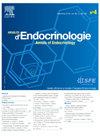Impact of moderate iodine deficiency on embryonic exposure to a mix of endocrine disruptors
IF 2.9
3区 医学
Q3 ENDOCRINOLOGY & METABOLISM
引用次数: 0
Abstract
Objective
We tested the hypothesis that moderate iodine deficiency (still frequent despite iodine supplementation of table salt since the 1970s in France) during gestation aggravates the action of endocrine disruptors (EDs) on thyroid hormone (TH) function. Some EDs interact at various levels with the thyroid system, inducing compensatory TH production, drawing on iodine reserves.
Material and method
Xenopus tropicalis embryos were exposed from cell-stage 2 to end of neurogenesis to a mix of 14 EDs previously shown to impact TH, cell proliferation and neuron differentiation. The embryos were further exposed to sodium perchlorate 20 mg/L in the fluid, to mimic moderate iodine deficiency. We assessed cerebral gene expression on qPCR, proliferation/apoptosis ratio on brain immunohistochemistry, and behavioral impact on tadpole motion.
Results
Expression of key TH axis genes was more severely inhibited under moderate iodine deficiency combined to EDs than under deficiency or EDs alone. Combined exposure also impaired tadpole motion and brain-cell proliferation.
Discussion
Even moderate iodine deficiency can aggravate the effects of a pollutant mix on the thyroid axis during critical phases and notably during embryonic development. These results suggest that it is important to limit exposure to chemicals, and also to take account of all components of the exposome that are liable to aggravate impact.
中度碘缺乏对胚胎暴露于多种内分泌干扰物的影响
目的验证妊娠期中度缺碘(尽管法国自20世纪70年代开始补充食盐,但仍经常缺碘)会加重内分泌干扰物(EDs)对甲状腺激素(TH)功能的影响。一些ed在不同程度上与甲状腺系统相互作用,诱导代偿性TH产生,吸收碘储备。材料和方法将热带非洲爪蟾胚胎从细胞阶段2到神经发生末期暴露于14种ed的混合物中,这些ed先前被证明会影响TH、细胞增殖和神经元分化。胚胎进一步暴露于20毫克/升的高氯酸钠液体中,以模拟中度碘缺乏。我们用qPCR方法评估了大脑基因表达,用脑免疫组织化学方法评估了增殖/凋亡比,以及行为对蝌蚪运动的影响。结果与单独缺碘或缺碘相比,中度缺碘联合缺碘对TH轴关键基因表达的抑制更为严重。综合暴露也会损害蝌蚪的运动和脑细胞的增殖。在关键阶段,特别是胚胎发育期间,即使是中度的碘缺乏也会加重污染物混合对甲状腺轴的影响。这些结果表明,重要的是限制与化学品的接触,并考虑到接触物中可能加剧影响的所有成分。
本文章由计算机程序翻译,如有差异,请以英文原文为准。
求助全文
约1分钟内获得全文
求助全文
来源期刊

Annales d'endocrinologie
医学-内分泌学与代谢
CiteScore
4.40
自引率
6.50%
发文量
311
审稿时长
50 days
期刊介绍:
The Annales d''Endocrinologie, mouthpiece of the French Society of Endocrinology (SFE), publishes reviews, articles and case reports coming from clinical, therapeutic and fundamental research in endocrinology and metabolic diseases. Every year, it carries a position paper by a work-group of French-language endocrinologists, on an endocrine pathology chosen by the Society''s Scientific Committee. The journal is also the organ of the Society''s annual Congress, publishing a summary of the symposia, presentations and posters. "Les Must de l''Endocrinologie" is a special booklet brought out for the Congress, with summary articles that are always very well received. And finally, we publish the high-level instructional courses delivered during the Henri-Pierre Klotz International Endocrinology Days. The Annales is a window on the world, keeping alert clinicians up to date on what is going on in diagnosis and treatment in all the areas of our specialty.
 求助内容:
求助内容: 应助结果提醒方式:
应助结果提醒方式:


